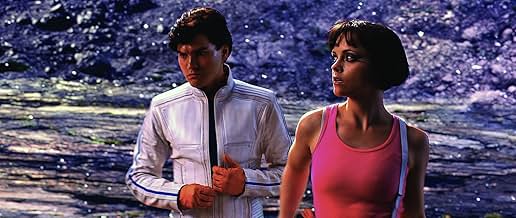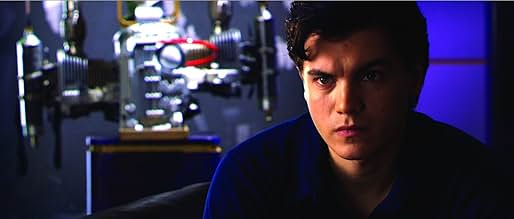Speed Racer
- 2008
- Tous publics
- 2h 15min
Un jeune pilote, Speed Racer, aspire à devenir champion du monde de la course avec l'aide de sa famille et de son automobile Mach 5 high-tech.Un jeune pilote, Speed Racer, aspire à devenir champion du monde de la course avec l'aide de sa famille et de son automobile Mach 5 high-tech.Un jeune pilote, Speed Racer, aspire à devenir champion du monde de la course avec l'aide de sa famille et de son automobile Mach 5 high-tech.
- Récompenses
- 1 victoire et 12 nominations au total
Giancarlo Ganziano
- Everyman Announcer
- (as Gian Ganziano)
Histoire
Le saviez-vous
- AnecdotesPeter Fernandez and Corinne Orr, the original English voices of Speed Racer/Racer X and Trixie/Spritle in Mahha GoGoGo (1967), voice race announcers in the film.
- GaffesDuring the first race, Speed is driving the Mach 6. Although many believe this car wasn't built until just before the final WRL Grand Prix at the end of the movie, the Mach 6 was Speed's main car until it was destroyed at Fuji. The Mach 6 was rebuilt for the Grand Prix since the Mach 5 still had the defensive features from Casa Cristo which weren't allowed.
- Crédits fousThe directors' credits spin out of a wheel, similar to how the title of Mahha GoGoGo (1967) appears.
- Bandes originalesGo Speed Racer Go
Written by Nobuyoshi Koshibe and Yoshida Yoshiyuki
Commentaire à la une
I saw this the same night as the latest film by my favorite filmmaker and I must admit that this held its own.
Sure, the story is silly and there are the requisite two lessons for children. All the shots with the parents could have been replaced with a dialog card so far as I care. But this is highly cinematic in a fine-grained sense.
Coursegrained long form would be the cinematic values of that Peter Greenaway film, where the narrative has substance and is cast cinematically. The contrast is shocking, with this Wachowski business seeming to be mere busy style.
But look again. There's real value in how the story is told even though the story is as close to vacuous white noise as possible. In fact, there's a statement there that matters. This movie is about movie-making. The watchers of the "race" are watchers of the movie. Its a simple fold.
I consider this the best of the brothers' films because their sometimes intriguing plots distract from their deeper intent. That intent is to visually explore what it means to watch. Sure, those plots are about watching as well. But people watch "The Matrix" and build religions around the story mechanics as if they matter. Previously, "Bound" was my favorite Wachowski film because it suppressed the noise of the story so as to equal the expression of that story in terms of the eye, the desire of eye.
These folks are to Welles as Coltrane is to Getz. They run riffs whose patterns are derived from the languid, meaningfilled studies of what went before, but which are presented so quickly you cannot possibly comprehend the fullness with which they were originally loaded.
That overloading of serious visual grammar has an immediate effect: that we are really there instead of digesting something filtered to be simple enough for us to understand. But there's a deeper effect: there is so much motion here, so many paths we can choose from to decide what we see, that there's a sort of tease between the film and our mind about what options they will present and what tricks they will use to suggest paths to comprehension. And on our part to discard, to race ahead of the track suggested, to speed ahead and get to the end before even the movie.
I consider this serious work, and an advance in film grammar that possibly will be profound.
Ted's Evaluation -- 3 of 3: Worth watching.
Sure, the story is silly and there are the requisite two lessons for children. All the shots with the parents could have been replaced with a dialog card so far as I care. But this is highly cinematic in a fine-grained sense.
Coursegrained long form would be the cinematic values of that Peter Greenaway film, where the narrative has substance and is cast cinematically. The contrast is shocking, with this Wachowski business seeming to be mere busy style.
But look again. There's real value in how the story is told even though the story is as close to vacuous white noise as possible. In fact, there's a statement there that matters. This movie is about movie-making. The watchers of the "race" are watchers of the movie. Its a simple fold.
I consider this the best of the brothers' films because their sometimes intriguing plots distract from their deeper intent. That intent is to visually explore what it means to watch. Sure, those plots are about watching as well. But people watch "The Matrix" and build religions around the story mechanics as if they matter. Previously, "Bound" was my favorite Wachowski film because it suppressed the noise of the story so as to equal the expression of that story in terms of the eye, the desire of eye.
These folks are to Welles as Coltrane is to Getz. They run riffs whose patterns are derived from the languid, meaningfilled studies of what went before, but which are presented so quickly you cannot possibly comprehend the fullness with which they were originally loaded.
That overloading of serious visual grammar has an immediate effect: that we are really there instead of digesting something filtered to be simple enough for us to understand. But there's a deeper effect: there is so much motion here, so many paths we can choose from to decide what we see, that there's a sort of tease between the film and our mind about what options they will present and what tricks they will use to suggest paths to comprehension. And on our part to discard, to race ahead of the track suggested, to speed ahead and get to the end before even the movie.
I consider this serious work, and an advance in film grammar that possibly will be profound.
Ted's Evaluation -- 3 of 3: Worth watching.
Meilleurs choix
Connectez-vous pour évaluer et suivre la liste de favoris afin de recevoir des recommandations personnalisées
Détails
- Date de sortie
- Pays d’origine
- Site officiel
- Langue
- Aussi connu sous le nom de
- Meteoro, la película
- Lieux de tournage
- Sociétés de production
- Voir plus de crédits d'entreprise sur IMDbPro
Box-office
- Budget
- 120 000 000 $US (estimé)
- Montant brut aux États-Unis et au Canada
- 43 945 766 $US
- Week-end de sortie aux États-Unis et au Canada
- 18 561 337 $US
- 11 mai 2008
- Montant brut mondial
- 93 945 766 $US
- Durée2 heures 15 minutes
- Couleur
- Mixage
- Rapport de forme
- 2.35 : 1
- 2.39 : 1
Contribuer à cette page
Suggérer une modification ou ajouter du contenu manquant





































